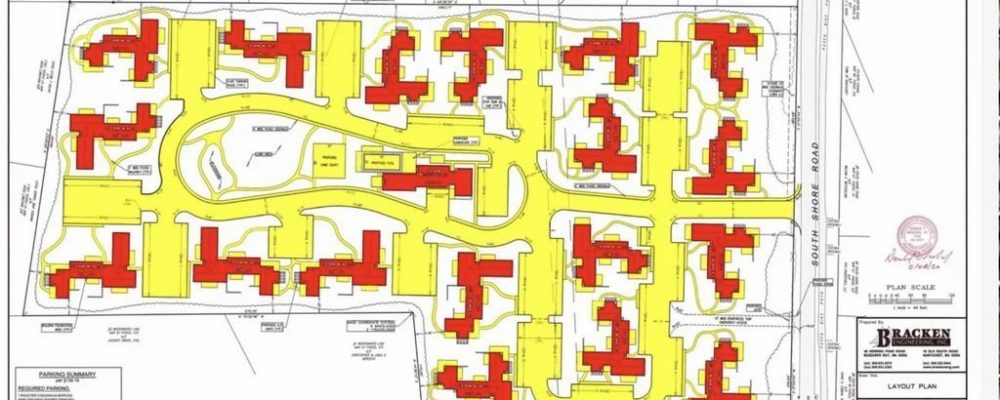The Nantucket Land & Water Council (NLC) is very pleased to have received Judge Wilkins’ favorable decision on their Motion to Intervene in the Housing Appeals Committee hearings on the Surfside Crossing 40B development.
The Nantucket Land & Water Council, a non-profit environmental advocacy organization, has been advocating for environmental protection and open space on Nantucket and Tuckernuck Islands since 1974. It has spent millions on land protection on Nantucket, including extensive efforts in the immediate vicinity of the Surfside Crossing 40B development. The area contains significant pitch pine forest, and the project site is home to many state listed endangered species. The project as proposed, which is 90% denser than local zoning allows, would fragment the local habitat and result in the clear-cutting of virtually the entire site.
The Housing Appeals Committee (HAC), the state agency charged with reviewing the developers’ appeal of the Nantucket Zoning Board of Appeals (ZBA) Comprehensive Permit, denied the Nantucket Land & Water Council’s motion to intervene as a party in its proceedings. It also made a determination that the developer’s substantially revised plans, submitted to the HAC without any local review or input, to construct 156 condominium units in 18 buildings, (as opposed to the 60 mixed single family and condominium units permitted by the ZBA), was not a substantial change and did not need to be remanded back to the ZBA for local review and approval. The Nantucket Land & Water Council and the Nantucket ZBA appealed these two decisions, respectively, to Superior Court. While the ZBA’s appeal of the substantial change issue may not be decided by the court until the HAC issues a final decision on the permit, the Nantucket Land & Water Council appeared in the Superior Court on May 13th to appeal its denial of intervention. “Judge Douglas Wilkins agreed with our argument, and reversed the HAC’s denial of our intervention,” said Emily Molden, Executive Director of the Nantucket Land & Water Council. “We are thrilled to have an opportunity to participate in the project review, and advocate, as we have for many years, for the protection of local interests and the unique and fragile Nantucket environment.”
The HAC based their denial, in part, on their conclusion that the preservation of open space is simply not an interest required to be considered by the agency in a Chapter 40B appeal from a local permit decision. The NLC maintained that this was a clear error of law, as Chapter 40B unequivocally includes the preservation of open spaces as one criteria for consideration when determining if a development proposal is “consistent with local needs.” The Judge agreed. As stated by Judge Wilkins, “It is also worth noting that the defendants have cited only one purpose of General Law c. 40B but have ignored others including the goal of General Law c. 40B, S20, to protect local interests in preserving open space”. Judge Wilkins recognized the Nantucket Land & Water Council’s central role in environmental protection on Nantucket, as well as the HAC’s obligation to consider local needs for open space in its decisions, something it has long resisted.
The appeal of the HAC’s denial of the Nantucket Land & Water Council’s intervention was a case of “first impression” in Massachusetts. Usually appeals from agency decisions have to wait until there is a final adjudication, but we claimed that denial of our right to participate so fundamentally affected our rights that our appeal should be allowed immediately. “If we waited for the conclusion of the HAC’s hearings to appeal the denial of our right to intervene and participate, we would not be recognized as a party to the case, and therefore would have no guaranteed right to appeal,” Molden said. The Judge has also supported the Nantucket Land & Water Council on this issue, stating “ NLC can participate in judicial review of a final HAC decision – but only if the ZBA decides to appeal and if the court exercises its discretion to permit intervention”…”A jurisdictional rule that depends upon assessment of the current and future predicted alignments of the interests of unrelated parties is unacceptably unpredictable. It is not what c 30A S14 contemplates”.
The Nantucket Land & Water Council had the high burden of demonstrating the invalidity of the HAC’s denial of its intervention, as generally courts give great deference to agency rulings, unless there is a clear and substantial error. The Nantucket Land & Water Council met that test. According to Judge Wilkins, “...the HAC committed an error of law in holding that NLC’s interests were not among those that c.40B “is intended to protect”. “There can be little question that, as a matter of statutory construction of c. 40B and the Nantucket Bylaw, the protection of open space is a cognizable interest for purposes of standing…HAC committed an error of law when it ruled that NLC”s interests did not fall within the zone of interests protected by c. 40B or the local Bylaw…the Decision therefore must be reversed”.
The Superior Court decision vacates the HAC’s denial of Nantucket Land & Water Council’s intervention dated July 13, 2020, and remands the matter back to the HAC for further consideration, in light of the decision. As a consequence of Judge Wilkins’ ruling, it is likely that the HAC proceedings to date will be vacated, and the matter will have to start over from the beginning, this time with the Nantucket Land & Water Council participating as a full party to the proceedings.

